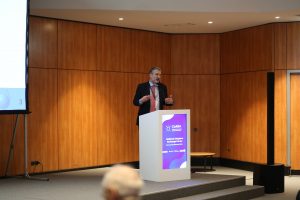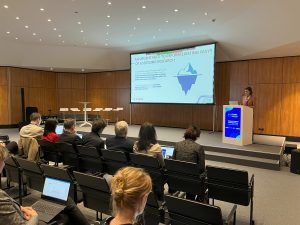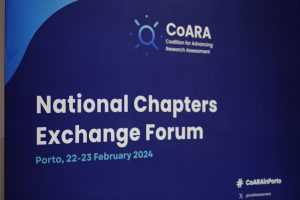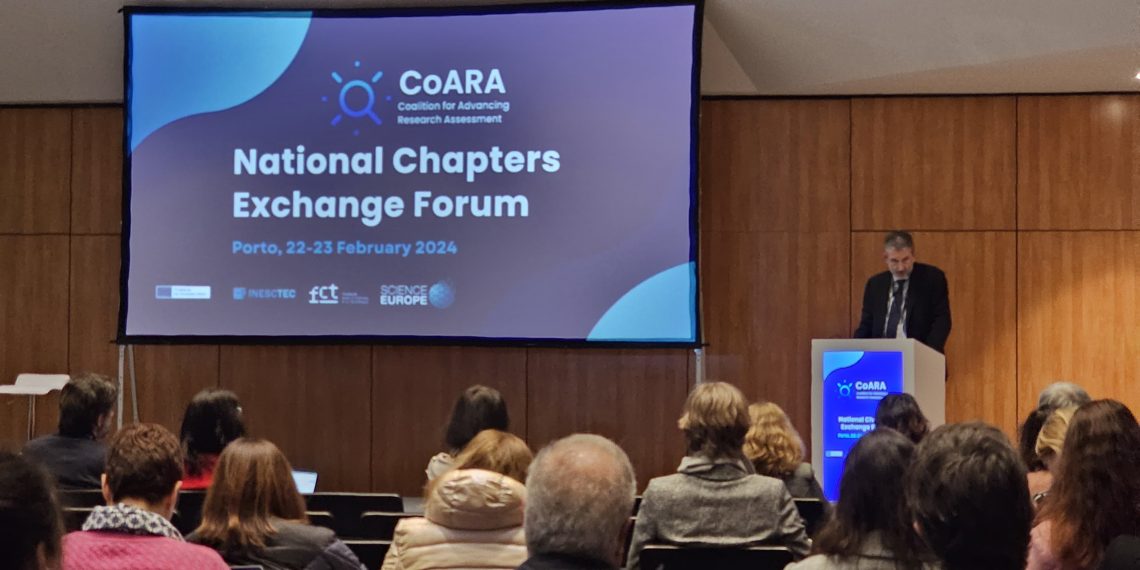Research. Impact. Assessment. Collaboration. Reform. These were the words most heard in the first discussion forum of CoARA – Coalition for Advancing Research Assessment, an international alliance that aims to implement a systemic reform of research, researchers, and research organisations’ assessment worldwide.
The event, co-organised by CoARA, INESC TEC, the Foundation for Science and Technology (FCT) and Science Europe, took place on February 22 and 23, at Alfândega do Porto; this initiative aimed to explore opportunities for collaboration between the countries part of this agreement. This forum was important to present the already constituted national chapters, and the ones going through said process (including the Portuguese), and all the work developed so far; it also promoted a discussion around the contexts and motivations, actions taken, expected results, problems and fears already identified.
“Bringing together representatives of international and national institutions, existing National Chapters and those under constitution, including the Portuguese, was an excellent opportunity to identify and further explore areas of collaboration between the various stakeholders, while sharing knowledge and exploring synergies”, explained João Claro, CEO of INESC TEC.

The strategy must now focus on the mobilisation of partners, the assessment of systems, the implementation of pilots, and the elaboration of recommendations, always with the long-term purpose of reforming research assessment, and improving the quality and impact of scientific work.
What is CoARA?
This work is being coordinated by CoARA – Coalition for Advancing Research Assessment – an international initiative established in December 2022, featuring more than 600 members from 46 countries, including Portugal. Considering the contexts of the different countries, CoARA contemplates the creation of National Chapters, which support the implementation of the Agreement’s targets at national and regional levels. These working groups promote the liaison and collaboration between entities in their respective countries, as well as the sharing of experiences and different realities, for a joint learning of all the members.

Currently, 11 national Chapters are constituted (Spain, Poland, Ukraine, Norway, Italy, Cyprus, Ireland, Hungary, France, Switzerland, and Finland); the Portuguese is currently in the final stage of creation, with FCT coordinating said process. Germany, the United Kingdom, and Sweden are going through the same process, leading to the current involvement of 15 national Chapters in the platform; it’s worth mentioning that others can initiate the process of integration at any time.
Among the organisations involved within these Chapters are research and development centres, higher education institutions, funding entities and national and regional authorities. The effort of each country is now to create synergies that allow the collaborative work of all these organisations towards developing systems that improve research in a cross-cutting way.
A long journey ahead
Since its implementation, CoARA has been welcoming signatories with concerns related to the research and development areas of their own countries. Some have a solid work and can present concrete proposals for the improvement of this system, while others are still in an embryonic phase of implementation and learning.
“The success of our participation is closely linked to observing the other Chapters and learn more about the solutions implemented and their benefits, like the involvement of associative entities, the strategic connection of pilot projects to context activities like regular calls and assessment processes, the development of flexible tools, the dual culture-structure change, or the implementation of effective platforms that support feedback mechanisms”, mentioned João Claro while presenting the Portuguese Chapter.
The suggestions presented by the countries at a more advanced stage cover different areas: from hiring and career progression, to funding and assessment of researchers, projects and institutions, or the publication of scientific papers. Thanks to this exchange of proposals, the CoARA platform hopes to unite efforts and generate beneficial results for all stakeholders.
The Portuguese case
Portugal did not want to be left out of this emerging movement that brings together initiatives at the global level to assess and implement improvements in the national research ecosystem. “We need to look at our reality and balance all activities. The Portuguese system is somewhat complex with all its dimensions, teaching and research careers, higher education institutions and public and private non-profit research institutions, national and regional funding, and respective management entities, among others. All this is based on legislation that seeks to leverage the different actors and dimensions. In this sense, our mission is to contribute to improving the assessment system of people, teams, projects, and institutions, advancing the research work carried out in Portugal and the potential impact on the scientific community and society,”, claimed João Claro.

The next steps are to define a work plan, broaden the involvement of institutions in different areas, gather national efforts already underway and direct them towards the purpose of the alliance, while identifying obstacles and ways to overcome them, always aware of what other countries are developing and promoting.
“The creation of a collaborative platform for the discussion of all topics is essential to bring together and involve key stakeholders, inside and outside the research domains. In addition to learning from other contexts, identifying barriers and how to overcome them, we aim to contribute to the global efforts with our experiences and outlooks”, he emphasised. “It’s a big challenge, but now it’s a more informed challenge”.




 News, current topics, curiosities and so much more about INESC TEC and its community!
News, current topics, curiosities and so much more about INESC TEC and its community!